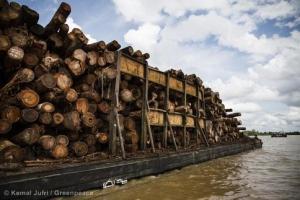18 January 2014 4 menit
Golden Agri, APRIL under fresh scrutiny for unsustainable practices
 Golden Agri-Resources and APRIL, two Singapore-based firms implicated in last year’s worst haze crisis, have been accused of falling short of their commitments to sustainability practices in Indonesia
Golden Agri-Resources and APRIL, two Singapore-based firms implicated in last year’s worst haze crisis, have been accused of falling short of their commitments to sustainability practices in Indonesia
In two separate announcements this week, Singapore-based Golden Agri-Resources and Asia Pacific Resources International Limited or APRIL were called out for unsustainable practices in Indonesia, almost six months after both companies were implicated in the most severe haze incident in the region.
The Forest Peoples Programme, an environmental NGO based in the United Kingdom, accused PT SMART, a palm oil subsidiary of the Singapore-listed Golden Agri-Resources group, of abusing the rights of the local community in a newly released report on Friday.
The 62-page document, called the “Independent Review of the Social Impacts of Golden Agri Resources’ Forest Conservation Policy in Kapuas Hulu District, West Kalimantan”, details how the land of indigenous peoples were grabbed unjustly and then set aside as ‘carbon stores’, further limiting the communities’ right of use and livelihood. The firm has since issued a statement thanking FPP for their findings, calling on the organisation to continue collaborating with them to prepare an action plan.
Separately, the World Business Council for Sustainable Development (WBCSD) has put Singapore-based paper and pulp company APRIL on probation for one year starting this month due to its deforestation practices.
The organisation of CEOs dedicated to sustainability and corporate social responsibility also has a Forest Solutions Group (FSG), which APRIL is now suspended from, until it can comply with its forest management and fibre procurement guidelines. Should the firm fail to stop clearing rainforests in Indonesia and using a majority of rainforest wood for its fibre supply, they will not regain admission into the FSG and their WBCSD membership will be reviewed.
Golden Agri and lack of consent
Both APRIL and Golden-Agri – members of the industry association Roundtable on Sustainable Palm Oil – were included in the eight firmspreviously named in the aftermath of the haze crisis in Singapore and Malaysia last June. These companies were blamed for burning forests and peatlands in Riau, Indonesia, which caused the transboundary air pollution.
“The aims of the RSPO standard and GAR’s new Forest Conservation Policy may be well-intentioned but they need to be observed in practice, not just on paper” Marcus Colchester, Forest Peoples Programme senior policy advisor
Prior to that, Golden-Agri had already been under the scrutiny of environmental groups for unsustainable business practices linked to deforestation.
The firm had responded by developing its own forest conservation policy in 2011 (an outlined policy that became a more detailed methodology in 2012), which states that they will no longer “clear any more forests or areas of peat”. The policy, formed in collaboration with Greenpeace and The Forest Trust, also outlined their commitment to “develop a new policy by which they could zone their concessions for areas of High Carbon Stocks (HCS) and then exclude them from future clearance”, said the report.
The problem with this move, is that they have set aside land belonging to the Dayak and Malay communities for their pilot site, FPP pointed out.
They alleged that one of PT SMART’s eight oil palm concessions in West and Central Kalimantan, PT Kartika Prima Cipta (PT KPC), grabbed lands from indigenous peoples and local fisher folk without their ‘free, prior and informed consent’. This land is supposedly set aside for ‘carbon stores’ or areas to be protected from clearances to ensure that carbon is not released into the atmosphere.
Norman Jiwan, director of the Indonesian ecological justice NGO TUK-Indonesia and a Dayak himself, said: “Our field studies show that PT KPC got communities to surrender their lands without due process … Yet the farmers can’t easily appeal the unfair land-grabs as none have a copy of the contract under which their lands were taken.”
This goes against the principles and criteria of the RSPO, and it also shows how the social implications of the Forest Conservation Policy were not adequately accounted for, explained FPP.
According to the report, the land-use zoning exposes communities to a “double whammy”, in which the High Carbon Stock areas restrict locals from cultivating the land while it directs companies to areas outside of the zone that have already been established as farms by the people, as such “their livelihoods might thus come under double pressure”.
Sumber/tautan:
http://www.eco-business.com/news/golden-agri-april-under-fresh-scrutiny-unsustainable-practices/
